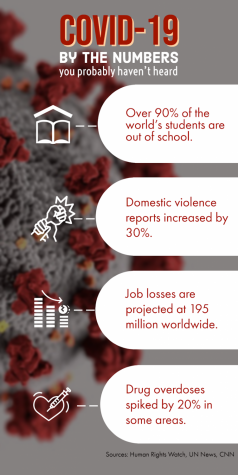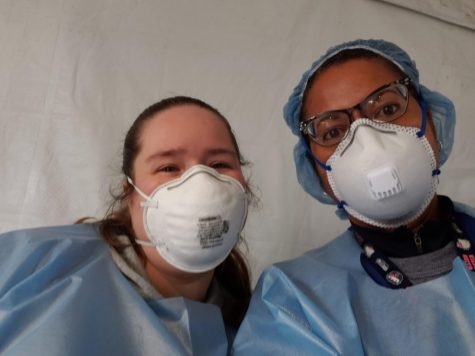Social engagement: COVID-19 edition
“We’re in this together.”
Right, we’ve all heard that. But amid the sea of articles urging us all to stay home, it can be difficult to see what we really are in together besides the quarantine. That’s why it is important now more than ever to stay socially active even as we remain in relative physical isolation.
 Social distancing measures, while protecting the physical health of our community, have inadvertently exacerbated existing problems.
Social distancing measures, while protecting the physical health of our community, have inadvertently exacerbated existing problems.
For example, with over 90% of the world’s student population out of school, young people face the challenges of unequal access to technology as distance learning becomes the norm. Even with the necessary equipment, many children don’t have the parental guidance needed to succeed.
“There’s a huge discrepancy in home education,” English teacher Henry Level shared. “I’m realizing that my kids have a huge advantage in having parents who are home and will actively teach a variety of subjects.”
The cost of school closures, however, is more than just a quality education. Children who relied on school as a source of nutrition and a safe place are now at greater risk for undernourishment, cyberbullying and other abuses, especially in the absence of care from adults who may be ill or preoccupied with work.
“For children who come from unstable homes, this can be a very negative or dangerous experience,” social studies teacher Andrea Antrim said. In fact, a recent report from the Human Rights Watch shows that the stay-at-home order is related to a 30% rise in domestic abuse cases.
Adults have their own share of sacrifices as unemployment rates soar to unprecedented levels. Coupled with the responsibility of providing care for their dependents, the financial stress can be crippling. Experts fear that this may be the beginning of a surge in mental health disorders and substance abuse.
“The social consequences of this pandemic are simply too numerous to list,” science teacher Eleanor Schneider said. She’s absolutely right—the total case numbers we see on daily news reports represent just one part of this multifaceted crisis, for the count of indirect COVID-19 victims lies in the billions.
With that said, few global catastrophes have called to attention the importance of individual action as much as the coronavirus. From six feet away, here are some things you can do to soften the blow of this pandemic:
- When supporting businesses, think of the small guys first.
“Personally, I try to order takeout from non-chain restaurants a few times a week and tip twice the normal amount.” -Henry Level
- For closed businesses, buy gift cards.
“The revenue businesses receive from the purchase of the gift card can help keep them afloat until they can open their doors.” -Anissa Pascale
- Use purchases to show support, but leave some for your neighbor.
“Remember that the food supply lines are not affected by this and that there will be food at the grocery store for you.” -Andrea Antrim
- Be generous towards charities.
“Charities that provide support for the homeless, elderly, and for first responders are in most need right now. Blood banks or places where you can donate blood are also in need of your support.” -Andrea Antrim
- Stay connected.
“Reach out to others via some sort of video communication tool. Check in frequently. ‘Get together’ to do something at the same time.” -Eleanor Schneider










